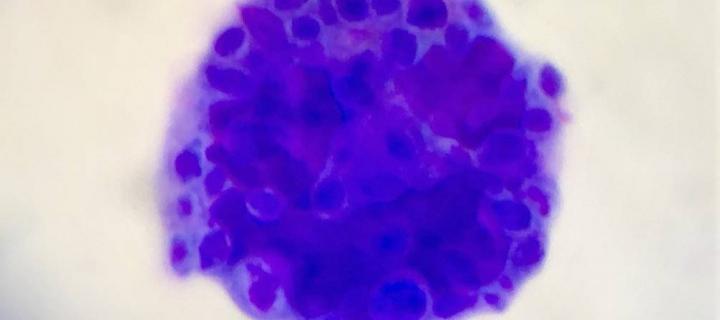Cat’s treatment highlights risk of rare infection
Treatment of a rare but potentially serious fungal disease in a cat has highlighted the risk of similar infections in animals and their owners.
The emerging disease, caused by Sporothrix humicola, which has been reported only once in the UK and five times in the world, is most likely to affect animals and humans with compromised immune systems.
Vets at the Hospital for Small Animals at the Royal (Dick) School of Veterinary Studies diagnosed and treated the fungal infection in a 12-year-old diabetic cat.
A wound on the animal’s nose was infected by Sporothrix humicola, which is common in the outdoor environment, but very rarely causes infection in animals and people. The cat is thought to have become infected through contact with soil, and without treatment it likely would have died.
The animal’s diabetes is likely to have made it more susceptible to infection, as its weakened immune system might not have been able to prevent disease taking hold.

Collaborative effort
Working alongside the owner’s local vets in north-east Scotland, Dr Tim Nuttall, a Specialist in Veterinary Dermatology at the Dick Vet, examined microscope photographs of the fungus and studied samples from a biopsy to determine the nature of the infection.
Microbiology experts at the Dick Vet’s Easter Bush Pathology Service used a technology known as Polymerase Chain Reaction (PCR) to replicate samples of fungal DNA, which were then analysed to pinpoint its genes.
In this way, vets were able to determine the type of fungus present in the cat’s wound and prescribe appropriate treatment.
The cat recovered after lengthy treatment with anti-fungal tablets and management of its diabetes with insulin.
Animals with underlying conditions that impact on the immune system may be more susceptible to infections such as these, and vets treating non-healing wounds and nodules should therefore consider the possibility of fungal infection, experts say.
Fortunately, PCR technology can now greatly help the speed and accuracy of the diagnosis in these cases.
The case, described in the Journal of Feline Medicine and Surgery, was successfully managed in collaboration with the PDSA and Abervet practices in Aberdeen.
This unusual case highlights that infections of this type can occur in animals and are more likely where the immune system is weakened. It also underscores the value of technology for rapid diagnosis and treatment, which is a significant advantage in cases such as this.
Molecular diagnostics such as PCR and other approaches are a powerful tool for shedding light on infections, especially rare or unusual cases as shown here. In this example it played a key role in diagnosing disease quickly and accurately and guiding the best treatment.
Related links
About the Royal Dick School of Veterinary Studies
The Royal (Dick) School of Veterinary Studies is a one-of-a-kind centre of excellence in clinical activity, teaching and research. Our purpose-built campus, set against the backdrop of the beautiful Pentland Hills Regional Park, is home to more than 800 staff and almost 1400 students, all of whom contribute to our exceptional community ethos.
The School comprises:
- The Roslin Institute
- The Global Academy of Agriculture and Food Security
- The Roslin Innovation Centre
- The Hospital for Small Animals
- Equine Veterinary Services
- Farm Animal Services
- Easter Bush Pathology
- The Jeanne Marchig International Centre for Animal Welfare Education
We represent the largest concentration of animal science-related expertise in Europe, impacting local, regional, national and international communities in terms of economic growth, the provision of clinical services and the advancement of scientific knowledge.


